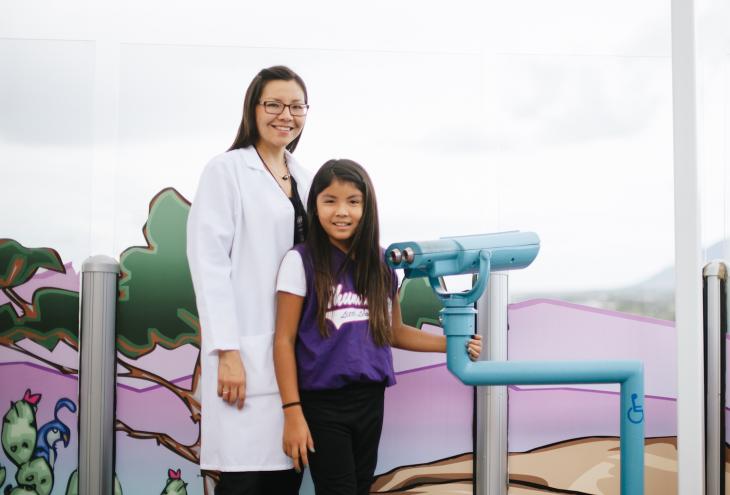The world of medicine is vast, and as a youngster Nizhoni Denipah knew she wanted to be part of it. She wasn’t sure what kind of medicine she would practice, but in high school Denipah, who is enrolled in the Navajo Nation and is also Ohkay Owingeh (formerly San Juan) Pueblo, Hopi, and Assiniboine, took a class to become a certified nursing assistant. She worked as a CNA through college, which gave her valuable clinical experience. She also made jewelry — a trade learned from her family — to help pay the bills. Networking through AISES and AAIP (the Association of American Indian Physicians) provided opportunities to meet mentors, shadow physicians, and attend pre-admission workshops to better prepare herself as a student and future medical school applicant.
As a senior in college, Denipah became pregnant, and as many would, she questioned the direction of her future. She asked her mom if she had to stop going to college to take care of her baby. Her mom emphatically told her, “No!” She recalls that her mom said, “You’ll just have to figure out how to do both.”
Denipah’s uncle Dr. Blake Lawrence was in family medicine, and her aunt Dr. Lynnae Lawrence practices internal medicine. She recalls watching her aunt go through medical school as a single parent of three, and therefore knew it could be done.
So Denipah did both, and graduated from the University of Arizona with a degree in physiological sciences. This degree typically leads to research, teaching, or medicine. She tried research and teaching; however, she says, “I just never was able to be turned off from medicine.”
Denipah subsequently earned her master’s degree at UA, took the MCAT (medical school entrance exam), and was overwhelmed. She opted to have her test thrown out, fearful that a bad grade would forever stain her record. Feeling as though she was still not yet a strong enough medical school applicant, Denipah moved home to Flagstaff, Ariz., and began working as a dental assistant, a job that would allow for clinical experience and further build her resume.
When Denipah was ready to apply to medical school, she thought of her uncle Blake. “He was always laid back, super modest,” she recalls. “He would hang out with my parents. He loved to sing.” She wanted to go to his alma mater, the University of Washington, but she didn’t get in. She was accepted at UA, but opted to enter medical school at the University of New Mexico in Albuquerque. As Denipah explains, her “nontraditional route” meant it took five years to get her bachelor’s degree. When she entered medical school, her daughter was in kindergarten.
When [Denipah] entered medical school, her daughter [Shadé-Phea Young, shown above] was in kindergarten.
Since she had experience with dentistry, and because she made jewelry, Denipah knew she enjoyed working with her hands, and thought surgery might be a good fit. As a medical student she ended up working with the chairman of the Department of Otolaryngology for one semester and found the clinic to be, as she recalls, “intriguing and fun!” It was medicine from the clavicle up, much of it in the mouth, and that was familiar territory for her.
“I couldn’t talk myself out of otolaryngology,” she says. Her area of practice may have been decided, but she was surprised at how competitive the residency application was. After four years of medical school and five years of residency, “I’m working — finally,” she laughs, as she is now practicing otolaryngology — ear, nose, and throat, as well as head and neck surgery — in Santa Fe, N.M.
Dr. Nizhoni Denipah found that her title took some getting used to. “As a medical student, some of my mentors referred to me as ‘Dr. Denipah,’” she says. “As you progress, more and more people call you ‘doctor.’ As a woman, I still get called ‘the nurse.’ Nurses are awesome, but I do correct people when they get it wrong.”
In college Dr. Denipah was involved in AISES but wishes there had been more physician mentors for students in medicine. Now she would welcome the chance to return to AISES as a speaker or mentor, and she is ready with some advice for college students. “Anything is possible,” she says, “but nobody is going to do the work for you.”











